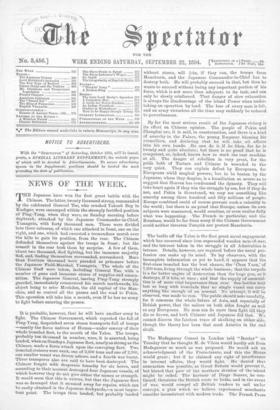It is probable, however, that he will have another army
to 'fight. The Chinese Government, which expected the fall of Ping-Yang, despatched seven steam transports fall of troops —mostly the fierce natives of Hunan—under convoy of their whole ironclad fleet, to the mouth of the Yaloo. The troops, -probably ten thousand in number, were, it is asserted, being landed, when on Sunday a Japanese fleet, nearly as strong as the Chinese, made a fierce attack upon the convoying fleet. Two ironclad cruisers were sunk, one of 3,600 tons and one of 2,300, one smaller vessel was driven ashore, and a fourth was burnt. Three transports also are said to have been destroyed. The Chinese fought with desperate tenacity for six hours, and according to their account destroyed four Japanese vessels, of -which however they do not give either the names or strength. It would seem that this is untrue, but that the Japanese fleet -was so damaged that it steamed away for repairs, which can be easily obtained in the Japanese dockyards,—a most impor- tant point. The troops thus landed, but probably landed
without stores, will join, if they can, the troops from Manchuria, and the Japanese Commander-in-Chief has to destroy both. He will probably succeed in that, bat then he wants to succeed without losing any important portion of his force, which is not more than adequate to its task, and can only be slowly reinforced. That danger of slow exhaustion is always the disadvantage of the island Power when under- taking an operation by land. The loss of every man is fell-, and an army victorious all the time may suddenly be reduced to powerlessness.


































